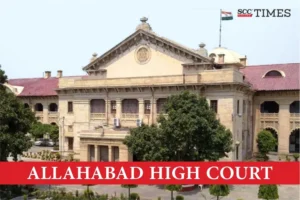Allahabad High Court: In an appeal filed by the father-in-law under Section 19 of the Family Courts Act, 1984 against the judgment and order passed by the Family Court, wherein the Court awarded monthly maintenance at the rate Rs. 3,000/- per month in favour of the daughter-in-law, the division bench of Saumitra Dayal Singh and Donadi Ramesh, JJ. held that the fact that the widowed daughter-in-law was living separately from her in-laws may not be a circumstance to disentitle her to claim maintenance from her father-in-law, in entirety.
Background:
The husband was a daily wage employee at the Irrigation Department. He was murdered in 1999. The wife has not remarried, and she claimed to have no source of survival. She pleaded that the amount Rs. 80,000/- which was paid to the father-in-law by the irrigation department towards terminal dues arising from the death of the husband had been misappropriated by him. She claimed that the father-in-law had sufficient agricultural holding to which her husband may have remained entitled, had he been alive. Arising therefrom, a claim has been made for the maintenance amount to be paid to the wife.
The father-in-law submitted that no amount was received by him towards terminal dues arising from the death of his son. Moreover, the wife refused to live in her matrimonial home and went back to her parental family.
Analysis and Decision:
The Court noted that the Family Court disbelieved the claim set up by the father-in-law that the daughter-in-law was remarried and that she was gainfully employed.
The Court also noted that the Family Court has awarded monthly maintenance of Rs. 3,000/- per month to the daughter-in-law from the date of impugned order i.e. 22-10-2013. Upon challenge raised in this appeal, on 5-12-2013, an interim order was passed providing for payment of interim maintenance at the rate Rs. 1,000/- per month.
The Court said that it is true that there was no evidence to accept the contention of the daughter-in-law that the father-in-law had misappropriated the amount Rs. 80,000/-. The case set up by the daughter-in-law in her maintenance application was disputed by the father-in-law at the first stage itself, i.e. at the stage of filing objections. The claim made by her in that regard was pressed only on the strength of oral evidence. No documentary evidence was filed by either party, in that regard.
The Court also said that there is nothing to doubt the claim of the father-in-law that he had made a fixed deposit of Rs. 20,000/-, in favour of the daughter-in-law.
Further, the Court said there is no evidence to conclude that the father-in-law was in receipt of Rs. 80,000/- paid by way of terminal dues to him.
The Court further rejected the submission of the father-in-law that the daughter-in-law was remarried and was gainfully employed as ‘Cook’ in a college, as neither the factum of remarriage was proved, nor was it admitted. Further, the Court upheld the Family Court’s observation that the certificate issued by the principal of the college was a mute document because it did not disclose the monthly income or remuneration payable to the daughter-in-law even if it were to be accepted that she was engaged as ‘Cook’ in the said educational institution.
The Court, while noting that the father-in-law is 70 years old and is himself dependent on his sons, said that by the interim order, sufficient relief had been granted to him and the award of monthly maintenance had been reduced to reasonable amount Rs. 1,000/- per month.
Thus, the daughter-in-law is entitled to the claim of maintenance from the father-in-law by virtue of Section 19 of the Hindu Adoptions and Maintenance Act, 1956.
As to the amount of maintenance, the Court clarified that the principle contained in Section 23 of the Hindu Adoptions and Maintenance Act, 1956 is to be considered.
The Court held that the fact that the widowed daughter-in-law was living separately from her in-laws may not be a circumstance to disentitle her to claim maintenance from her father-in-law, in entirety.
The Court noted that it is not a mandatory condition of law that for a daughter-in-law to claim maintenance, she must first agree to live at her matrimonial home. The Court remarked that in the societal context in which law must be applied, it is not uncommon for widowed women to live with her parents, for varied reasons and circumstances. Merely because the woman may have made that choice cannot be concluded to mean that she had separated from her matrimonial home without reasonable cause or that she would have sufficient means to survive on her own.
Thus, the Court partly allowed the appeal and upheld the interim order which reduced the amount of maintenance to Rs. 1,000/- per month.
[Shree Rajpati v. Bhuri Devi, First Appeal No. 696 of 2013, decided on 31-08-2024]
Advocates who appeared in this case:
Counsel for Appellant: J.C. Sharma, Ravindra Kumar Pandey
Counsel for Respondent: Hitesh Pachori

